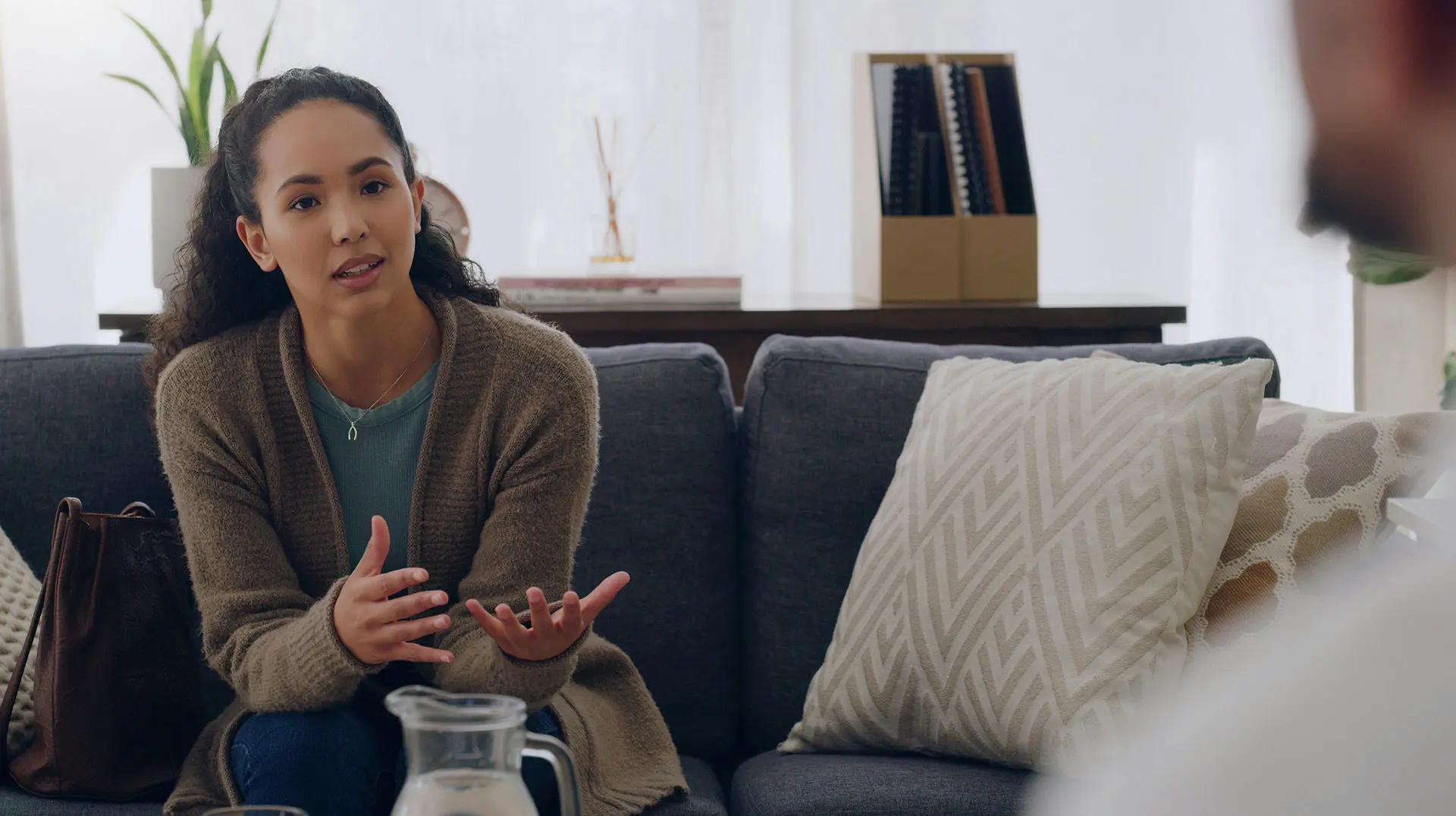Many people live with anxiety that does not seem to improve, even after trying different medications or types of therapy. This experience can feel frustrating and isolating. At Harmony Hills, we often meet individuals who have tried several approaches and still find the long-term effects of anxiety disorders interfering with daily life.
Treatment-resistant anxiety, sometimes called refractory anxiety, describes anxiety that continues despite completing standard treatments. This is not uncommon; according to a paper published in Molecular Psychiatry, approximately 40% of people with different anxiety disorders experience this kind of ongoing struggle.
What is Treatment-Resistant Anxiety?
Treatment-resistant anxiety is a term used when anxiety symptoms remain bothersome after trying first-line treatments. These treatments typically include evidence-based therapy, such as cognitive behavioral therapy, and medications like antidepressants or anti-anxiety drugs.
An adequate trial of treatment usually means 8 to 12 weeks on a therapeutic dose of medication or 12 to 16 sessions of therapy. If anxiety symptoms are still strong after these efforts, the condition may be called treatment-resistant.
Treatment-resistant anxiety can occur in several different anxiety disorders. This includes generalized anxiety disorder, panic disorder, social anxiety disorder, and obsessive-compulsive disorder (OCD). People with this kind of anxiety may continue to feel worried, restless, or fearful, even when following a treatment plan closely.
According to an article in The Journal of Lifelong Learning, up to 60% of people with an anxiety disorder will experience treatment-resistant symptoms at some point. This can affect school, work, relationships, and overall well-being.
At Harmony Hills, clinicians work with individuals facing treatment-resistant anxiety, offering a range of approaches for those who have not found relief through standard treatments.
Why Anxiety Becomes Resistant to Standard Treatments
Anxiety can sometimes be resistant to standard treatments for several reasons. One reason involves biological factors. Differences in how a person’s brain works, or genetic traits inherited from family, can affect how well someone responds to medications or therapy.
Comorbid conditions are another factor. People who have other mental health challenges, such as depression or attention-deficit/hyperactivity disorder (ADHD), or certain medical illnesses, may find that their anxiety is harder to treat. It is common for treatment-resistant anxiety and depression to appear together.
Environmental factors also play a role. Ongoing stress, trauma, or difficult life situations can make it challenging for standard treatments to work as expected.
Treatment factors can contribute as well. Sometimes, the dose of medication is too low, the type of therapy does not fit the person’s needs, or it can be difficult to follow the treatment plan consistently.
How to Recognize When Anxiety has Become Refractory
Treatment-resistant anxiety can look different from person to person, but there are some common signs to watch for. One sign is when there is no noticeable improvement after at least three months of regular treatment. This includes taking medications as prescribed or attending therapy sessions on a consistent schedule.
Another sign is when anxiety continues to cause problems in daily life. For example, it may be hard to keep up with work, maintain relationships, or manage everyday tasks because of ongoing anxiety. If anxiety keeps interfering with important areas of life, even after trying recommended treatments, it may be considered refractory.
Multiple treatment failures are also a possible warning sign. This happens when a person has already tried two or more different medications or types of therapy and has not experienced relief. Often, doctors look for improvement on standardized tests or rating scales. If anxiety symptoms remain moderate to severe on these scales, despite following treatment plans, this can be another indicator.
When these patterns are present, a professional assessment can help identify the most appropriate next steps for care.
Advanced Medication Options for Refractory Anxiety Disorders
When standard medications do not ease anxiety symptoms, there are advanced options that involve changes to medication plans. These options require careful supervision by medical professionals.
1. Medication Augmentation Strategies
Sometimes, a second medication is added to a current treatment to improve results.
– Buspirone can be used along with SSRIs or SNRIs to increase their effect.
– Low doses of certain antipsychotic medications, such as aripiprazole or quetiapine, are sometimes used for severe anxiety.
– Beta-blockers may be used to reduce the physical symptoms of anxiety, like a fast heartbeat.
2. Novel Medication Approaches
Some newer or less common medications are being studied for treatment-resistant anxiety.
– Glutamate modulators, such as riluzole, are a focus of ongoing research.
– Esketamine, which is related to ketamine, is being tested for people whose anxiety does not respond to other treatments.
– Some anticonvulsant medications, including pregabalin and gabapentin, may be helpful for certain individuals.
3. Medication Optimization
Adjustments to how medications are taken can affect how well they work.
– Dosage may be changed to reach a level that is more effective.
– The timing of when medications are taken, such as morning or night, can be changed.
– Interactions with other medications are considered, since some drugs can affect how anxiety medications work.
All medication adjustments are made with oversight from a qualified medical provider. Harmony Hills has psychiatric professionals who work with individuals to review and optimize medication plans for complex cases.
Therapy Approaches Beyond Traditional Methods
If standard therapy does not improve treatment-resistant anxiety, several advanced approaches are available.
1. Intensive Treatment Programs
Intensive outpatient programs (IOPs) involve attending therapy sessions several times a week, which provides more frequent support than traditional weekly therapy. Partial hospitalization programs allow individuals to participate in structured treatment during the day but return home at night. Residential treatment involves living at a treatment facility where support and care are available around the clock.
2. Specialized Therapy Modalities
Acceptance and Commitment Therapy (ACT) focuses on increasing flexibility in thinking and learning how to live with uncomfortable feelings. Eye Movement Desensitization and Reprocessing (EMDR) is used to process trauma-related anxiety. Exposure and Response Prevention (ERP) is a therapy that helps individuals gradually face situations that cause anxiety, which is especially useful in obsessive-compulsive disorder (OCD) and certain phobias. Group therapy for anxiety creates an environment for people to share experiences and learn from each other.
3. Technology-Assisted Interventions
Virtual reality exposure therapy introduces individuals to anxiety-provoking situations using computer simulations, which can help with phobias and post-traumatic stress disorder (PTSD). Biofeedback uses sensors to provide information about physical responses, such as heart rate, so individuals can learn to manage these responses. Transcranial magnetic stimulation (TMS) is a procedure that uses magnetic fields to stimulate nerve cells in the brain and is being studied for its effectiveness in treatment-resistant anxiety.
Harmony Hills provides these therapy options and creates individualized treatment plans based on each person’s specific situation.
Holistic and Lifestyle Interventions for Treatment-Resistant Anxiety
Complementary approaches are sometimes used alongside medical or psychological treatments to address treatment-resistant anxiety. These methods focus on the whole person, including the mind, body, and social environment.
1. Mind-Body Interventions
Mindfulness-based stress reduction (MBSR) is an eight-week program designed to teach mindfulness meditation and techniques for managing stress. This program may include activities such as guided meditations and group discussions.
Yoga therapy uses specific physical postures and controlled breathing exercises. These are selected to help lower stress by engaging the body’s relaxation response.
Progressive muscle relaxation is a technique where a person tenses and then relaxes different muscle groups in a specific sequence. This process can decrease muscle tension often associated with anxiety.
2. Nutritional and Physical Approaches
Nutritional and physical strategies have been studied as supportive measures for anxiety resistance. The following table summarizes some options:
| Intervention | How It Helps | Evidence Level
|
| Omega-3 supplements | Reduces inflammation | Moderate |
| Regular exercise | Increases endorphins | Strong |
| Sleep hygiene | Regulates stress hormones | Strong |
| Magnesium supplements | Calms nervous system | Limited |
Omega-3 supplements are studied for their potential to reduce bodily inflammation, which is sometimes linked to anxiety. Regular exercise can affect chemicals in the brain called endorphins. Sleep hygiene involves habits or routines that support healthy sleep patterns. Magnesium supplements are sometimes considered for their role in calming the nervous system, though the research is less established.
3. Support System Optimization
Support systems are an important part of managing treatment-resistant anxiety. Family therapy can improve relationships by bringing family members together to understand each other’s experiences and support the person with anxiety. Peer support groups provide opportunities to meet others who have similar experiences, which can reduce feelings of isolation. Community resources, such as local organizations, may offer information, education, and additional support services.
FAQs About Treatment-Resistant Anxiety
What percentage of people with anxiety disorders develop treatment resistance?
About 30-40% of people with anxiety disorders experience some level of treatment resistance. This number can change depending on which type of anxiety disorder is present and the person’s unique situation.
How long should I try a treatment before considering it ineffective for my refractory anxiety?
Most mental health professionals consider a treatment to be effective or not after trying medication for 8-12 weeks at the right dosage, or after 12-16 sessions of therapy. This timeline allows enough time to see if symptoms improve.
Can treatment-resistant anxiety and depression occur together?
Treatment-resistant anxiety can occur with other mental health disorders like depression. Treatment-resistant anxiety and addiction often go hand-in-hand as well. When this happens, a treatment plan often includes care for both conditions, sometimes called a dual-diagnosis approach.
Are there any new breakthrough treatments for anxiety resistance?
Some new treatments being studied or used for anxiety resistance are glutamate modulators such as riluzole, transcranial magnetic stimulation (TMS), and intensive outpatient programs that use several evidence-based therapies together.
Will insurance cover advanced treatments for refractory anxiety disorders?
Insurance coverage depends on the provider and the exact treatment. Many advanced treatments, like TMS and intensive outpatient programs, are now more commonly covered when medical necessity is shown.
Finding Hope When Nothing Seems to Work
Treatment-resistant anxiety can feel overwhelming, especially when previous treatments have not brought noticeable improvement. However, this condition does not mean anxiety cannot change with a different approach. A thorough assessment by mental health professionals can help identify factors that may have been missed, such as other health conditions, medication interactions, or underlying stressors.
Advanced therapies, medication changes, and holistic practices are available for those with treatment-resistant anxiety. These options may include medication adjustments, specialized forms of therapy, or complementary methods like meditation therapy or group support. Many individuals who have experienced limited success with standard treatments have found relief through a combination of these strategies.
At Harmony Hills, care teams use a multidisciplinary approach, which means different types of health professionals work together to create an individualized plan. Personalization of treatment is key because each person’s experience of anxiety is unique. Treatment-resistant anxiety is considered manageable with the right combination of strategies, even if progress has been slow in the past.
If you or someone you know is experiencing treatment-resistant anxiety, Harmony Hills provides assessments and care for complex cases. Contact us for more information today.
References:
https://www.psychiatry.org/patients-families/anxiety-disorders
https://www.nimh.nih.gov/health/topics/anxiety-disorders





